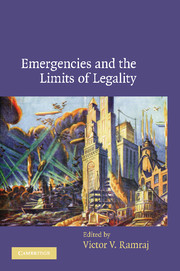Book contents
- Frontmatter
- Contents
- List of contributors
- Preface
- Introduction
- PART ONE Legality and extra-legality
- PART TWO Conceptual and normative theories
- PART THREE Political and sociological theories
- 6 The constitutional politics of emergency powers: some conceptual issues
- 7 A topography of emergency power
- 8 Law, terror and social movements: the repression-mobilisation nexus
- PART FOUR Prospective constraints on state power
- PART FIVE Judicial responses to official disobedience
- PART SIX Post-colonial and international perspectives
- Index
- References
8 - Law, terror and social movements: the repression-mobilisation nexus
Published online by Cambridge University Press: 10 August 2009
- Frontmatter
- Contents
- List of contributors
- Preface
- Introduction
- PART ONE Legality and extra-legality
- PART TWO Conceptual and normative theories
- PART THREE Political and sociological theories
- 6 The constitutional politics of emergency powers: some conceptual issues
- 7 A topography of emergency power
- 8 Law, terror and social movements: the repression-mobilisation nexus
- PART FOUR Prospective constraints on state power
- PART FIVE Judicial responses to official disobedience
- PART SIX Post-colonial and international perspectives
- Index
- References
Summary
A striking feature of the legal literature on the ‘war on terror’ is the dearth of empirically based socio-legal input. For the most part, lawyers have engaged with the issue as a philosophy of law exchange on law's role (or Schmittian influenced non-role) in counter-terrorism, shading at the edges into a law-and-policy debate. This approach has obvious strengths – within the internal logic of its discourses the philosophical quandaries are real and the policy dilemmas pressing – but it has also certain weaknesses, not least in what is not said.
The socio-legal gap may be explained partly in terms of the difficulty of conducting original, particularly empirical, research in the area; partly in terms of timing and partly in terms of the novel challenge of theorising a situation in which the world's only remaining superpower apparently retreats from legality in the pursuit of hegemony. The sensitivity of the field means that the state may place formidable obstacles in the way of gathering empirical data on the internal dynamics of its ‘counter-terrorist’ legal armoury. Assembling original quantitative data (for instance on the operation of emergency courts and tribunals and on interrogation practices) is likely to require high levels of official clearance in a situation in which the state may have a vested interest in avoiding public examination of its record and where security concerns may be strongly articulated.
- Type
- Chapter
- Information
- Emergencies and the Limits of Legality , pp. 172 - 198Publisher: Cambridge University PressPrint publication year: 2008
References
- 1
- Cited by



